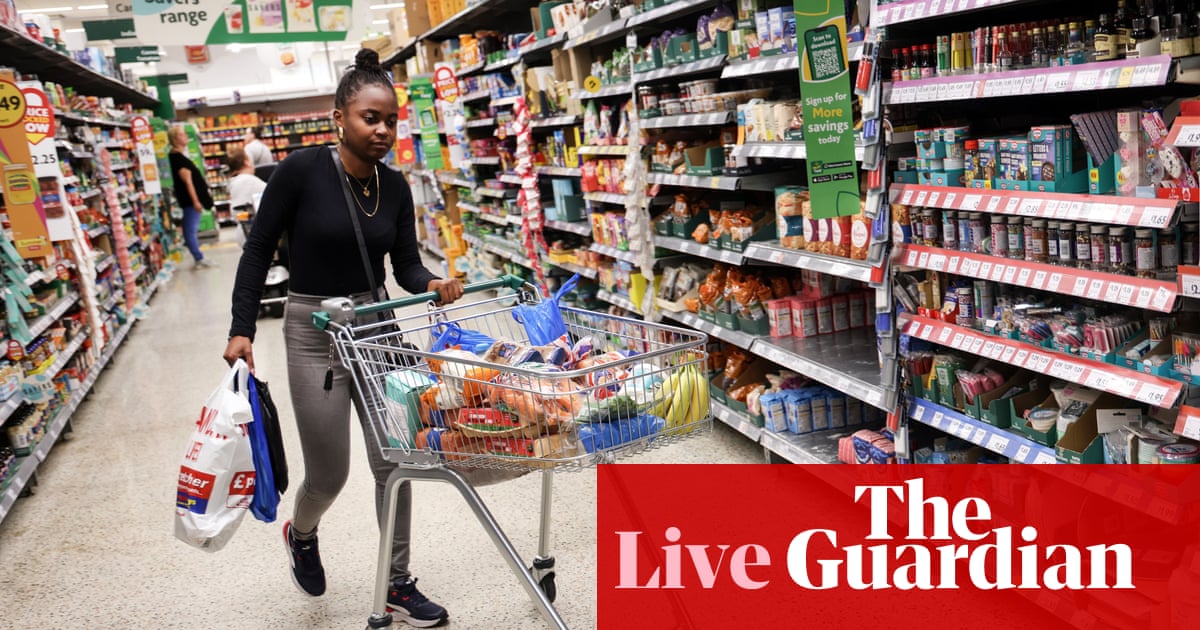
And finally... Europe’s stock markets have recorded a strong bounceback from their losses yesterday.
The FTSE 100 index has posted its biggest one-day rise in two months, after its worst fall in three weeks.
It closed 91 points higher at 7121, up 1.3%, with mining companies leading the way. Banks also rallied, after both sectors were hit yesterday amid worries about growth and Covid-19.
France’s CAC jumped 2%, while Germany’s DAX gained 1.7%, with Volkswagen up almost 6% after reporting those strong sales and profits for the first half of this year.
The recovery seems to be supported by calmer scenes in the bond markets, where US Treasury yields have risen after a plunge yesterday.
Macro analyst Alfonso Peccatiello has a good theory about why US government bond yields tumbled so sharply on Thursday:
Today’s UK trade data showed that British goods exports to the European Union rose to their highest since October 2019 in May, after a slump at the start of the year.
But as flagged before, imports have not shown the same recovery.
Economist Julian Jessop has a couple of ideas why....
With excitement building ahead of Sunday’s Euro 2020 climax, a lot has changed since England’s men last contested an international football final.
NatWest chief economist Seb Burnside has highlighted how wages and prices have both risen over the last 55 years - with houses, and beer, notably pricier.
Inflation: You’d need £19 today to buy what cost £1 back in 1966
Wages: But helpfully, average earnings are now 43 times higher, showing how much living standards have risen
Housing: Except that is when it comes to affording to buy a house, which is now 70 times more expensive!
Beer: The price of a pint has shot up too, from 5p to £3.10, a factor of 62!
Bucking the trend: Wembley’s capacity in 1966 was 90,000. 30,000 more than were allowed in to watch the semi-final, albeit final permissible ticket numbers for Sunday are still unknown.
Volkswagen sees strong recovery, but H2 chip bottleneck looms
German carmaker Volkswagen has warned that the bottleneck in semiconductors has shifted into the second half of this year... as its profits rise above pre-pandemic levels in the first six months.
VW says trading has been strong during 2021, but also flags up that the chip shortage will be a factor in the next six months.
The deliveries to customers of the Volkswagen Group continued to recover strongly in the first half of the current year, leading to a very strong Group turnover as well as a very high operating profit.
Also the reported Automotive net cash position showed a very positive development. The bottleneck in semiconductors has shifted and will rather impact us in H2.
It now expects to make an operating profit of around €11bn in the first half of this year.
That would exceed the €9bn it made in the first half of 2019, before it was dragged into the red in the first half of last year by the pandemic.
One of the big stories of the week has been China’s crackdown on its tech sector, notably Didi, just days after it floated in New York.
Our China affairs correspondent Vincent Ni has looked into Beijing’s fight against tech’s ‘barbaric growth’, and reports:
Over the past two years, multiple state agencies – from the financial regulators to the new market watchdog and the cybersecurity authorities – have been drafting new rules to regulate China’s booming tech sector, long before Didi’s New York listing. Earlier this year, the People’s Bank of China proposed tightening rules for businesses that collect personal and corporate credit data, as it vowed to improve data privacy protection.
But as well as protecting consumers, this is also about control – control of what companies do and control of the massive amounts of data they collect about their users. It is an issue that has become even more urgent today as tensions between the US and China deepen.
“In Beijing’s control of data, ‘sovereignty’ is [now] prized more than ever in the context of US-China tensions,” says Duncan Clark, a Beijing-based veteran tech investor and author of a book on Alibaba, the e-commerce giant founded by Jack Ma. “And in reasserting the state’s authority over big tech, China wants to reduce – or eliminate – vulnerabilities.”
But this is also a fine line to tread for the state, Clark says. “[After all], the state and its tech firms need each other, as tech companies drive innovation, efficiency and stimulate the consumer economy.”
Over in Canada, job creation has picked up after Covid-19 restrictions were eased.
Statistics Canada reports the economy added 230,700 jobs in June, as restrictions put in place to slow the pandemic were rolled back in many parts of the country.
They say:
Compared with the May reference week, public health restrictions had been significantly eased in several jurisdictions by the end of the June reference week.
Most indoor and outdoor dining, recreation and cultural activities, retail shopping, and personal care services had resumed or continued in eight provinces, with varying degrees of capacity restrictions.
But.... the gains all came in part-time positions, which rose 263,900, while the number of full-time jobs fell 33,200. And this job creation was concentrated among young people aged 15 to 24, who have generally been hit hard by the pandemic.
Despite this pick-up, Canada is still missing 340,000 jobs, or almost two per cent, compared to pre-pandemic employment levels.
In the markets, Wall Street has opened higher, as investors recover their nerve after Thursday’s wobble.
Recovery stocks are back in demand, pushing the Dow Jones industrial average up by 310 points or 0.9% in early trading, to 34,732.
Financial stocks and industrials are in demand, with Goldman Sachs (+2.8%), chemicals firm Dow Inc (+2.2%) and construction equipment maker Caterpillar (+2.1% in the risers.
Tech stocks are lagging, though, with the Nasdaq Composite only up 0.15%.
Back on GDP.... the NIESR economic research institute have forecast that the UK economy will have grown by 0.9% in June, continuing the slowdown.
That would be slightly faster than May, but still weaker than in April and March during the initial easing of lockdown.
They also predict growth will slow in the third quarter of 2021:
May’s month-on-month growth of 0.8% disappointed, with little sign of momentum in either April or May outside the sectors which grew due to the lifting of Covid-19 restrictions.
With several indicators showing slowing activity after the spring momentum, we expect growth in June of 0.9 per cent, and 4.8 per cent for the second quarter of 2021 overall.
With catch-up potential still evident in hospitality, transport, business support and the arts, we forecast growth of 1.9 per cent in the third quarter, still notably above historical trend growth rates.
But with Covid-19 cases rising again, and consumer caution evident, the lifting of further restrictions on July 19th risk boosting the economy in the short term at the expense of a longer lasting and more sustainable recovery. Much will depend on the roll-out and efficacy of the vaccines in the context of the Delta variant.
Although UK trade with the EU picked up in May, there could be more disruption this summer if British holidaymakers head abroad for holidays.
The head of the port of Dover has told Reuters that an increase in traffic will cause pressure, due to the extra paperwork at the border for freight at the border -- highlighting the need for more investment at the site.
Here’s the story:
A pre-Brexit trade rush led to 20-mile queues, but Doug Bannister, CEO of the Port of Dover, told Reuters the site had so far managed the switch to customs checks well, after Britain left the EU trade bloc at the end of 2020.
“That’s because we haven’t seen the demand for tourists coming from our facilities, as we would normally expect to see,” he said on a bright sunny day as a ferry departed for Calais.
“There will be longer transaction times and more processing,” Bannister said, if there was a rapid return of passenger cars to Dover, which was used by some 2.4 million trucks, 2 million tourist cars and 74,000 coaches in 2019.
UK exports to EU climb, but imports still weak
UK goods exports to the European Union rose in May, while imports from the EU remain much lower than before the Brexit deal came in.
That’s according to the latest trade data, released by the Office for National Statistics, after a processing error caused a delay from 7am.
It shows that total exports of goods, excluding precious metals, increased by £1.3bn (4.9%) in May, driven by a £1.0bn (8.0%) increase in exports to EU countries.
Imports dipped by around £500m, due to a £700m drop in goods arriving from non-EU countries, which offset a slight increase of £100m from the EU (again, this excludes precious metals).
But despite that, the UK imported more from non-EU countries than the EU for the fifth consecutive month, although the gap is narrowing.
Revisions to previous data show the UK exported more to the EU in February and March than previously reported, and imported less than first thought in January and February.
Thomas Sampson, associate professor at the London School of Economics, says UK imports from the EU have ‘collapsed’ this year, compared to levels in 2019 (before the pandemic, and the end of the Brexit transition).
Sampson has helpfully crunched the data, to show that UK-EU goods trade is lower than before the Brexit deal came in, but with imports into the UK taking a bigger hit than exports the other way.
But there is a proviso... the EU’s statistics body, Eurostat, shows a much bigger fall in UK exports to the EU.
(The pair do use different methodology, and different collection methods, but issue hasn’t yet been fully explained)
Full story: UK growth slows as computer chip shortage hits carmaking
Britain’s economic recovery stumbled in May when growth slowed to 0.8% after a contraction in building work and a slump in car production.
It was the fourth consecutive month of GDP growth, and followed 2% growth in April, but the slowdown in May was sharper than expected after City economists had forecast a 1.5% increase.
The Office for National Statistics (ONS) said the manufacturing industry was hit by a shortage of computer chips that forced car companies to cut back production.
As a result, transport equipment manufacturing fell by 16.5%, its largest fall since April 2020 and the worst period of the coronavirus pandemic.
Shortages of timber and steel brought many building projects to a standstill and led to the construction sector shrinking for a second consecutive month by 0.8%.
Over the three months to May, GDP grew by 3.6%, mainly because of strong retail sales over the period as non-essential shops, bars and restaurants opened their doors....












